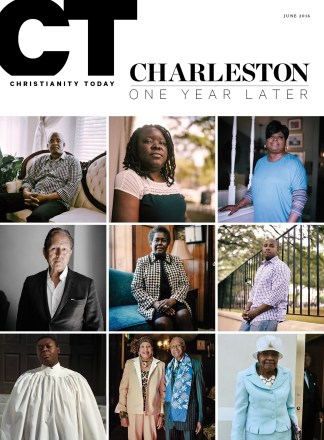Twenty years ago, a healthier relationship between Christianity and the fine arts seemed to be on the horizon. Image Journal and CT sister magazine Books & Culture had launched. In 1999, I traveled to Austin on behalf of another magazine, re:generation (which I then edited), to profile a young man named David Taylor, the “arts pastor” at Hope Chapel. He was the first person I had ever met with that title.
Since then, I have met more and more arts pastors. Image and Books & Culture are, thankfully, with us still (re:generation is not). Considerably more Christians are arts-literate, and eager to support and engage artists, than two decades ago. Some of the efforts sponsored by Christians have reached impressive scale, like the annual citywide ArtPrize project in Grand Rapids, Michigan.
There is also more support today for artists whose work goes beyond explicitly Christian themes. Makoto Fujimura’s abstract expressionism commands ever higher prices from collectors, including many Christians, and he has recently taken a position at Fuller Theological Seminary alongside Taylor. Charlie Peacock founded Art House America and has mentored a generation of Christian musicians and other artists with his wife, Andi Ashworth. Much of his early work (including with Amy Grant) was radio-ready. But in 2005 he released a free jazz album, Love Press Ex-Curio, and has produced records that cross all genres.
Yet even as churches are more willing to engage the arts, artists who work at the highest levels of craft are engaging the church less readily. This may be because, broadly speaking, Christians continue to vote with their dollars for popular entertainment. The God’s Not Dead franchise has grossed more than $70 million to date. Producers of heartfelt but musically unchallenging worship music are making more money than any church musician in history. Paradoxically, the success and visibility of “Christian” entertainment may actually be making it harder for serious artists to identify publicly as Christians.
At the most basic level, Christians who care about artistic excellence need to put their money where their heart is.
If we evangelicals want the fine arts and literature to thrive, we need to support both arenas in two ways: with our money and with our institutions. At the most basic level, Christians who care about artistic excellence need to put their money where their heart is. Two opportunities will come this fall, with the wide release of Nate Parker’s film Birth of a Nation and Martin Scorsese’s film adaptation of Shūsako Endo’s Silence. Both raise difficult questions about the ways Christianity can be subverted, co-opted, and betrayed by its own adherents. Will Christians embrace art that both takes faith utterly seriously and also portrays faith’s fault lines and limits?
In any case, consumer support only goes so far. The most enduring works of art—paintings, music, architecture, and literature—were often commercial failures during their makers’ lifetimes. So we need to build institutions—efforts to curate and create great art that have a horizon beyond the current moment. Some of the most influential would-be institutions of the past 20 years—like Manhattan’s world-class Museum of Biblical Art—have not survived. Ironically, the global art market is thriving, but chasing the hot ticket at international fairs like Art Basel is very different from investing in long-term excellence.
Even still, most of us can make choices—with our attention, our encouragement, and our modest spending—to support today’s artists of faith. Pope Benedict XVI said that the greatest witness the church can offer to a skeptical world is the lives of its saints and the beauty of its art. In many ways, evangelicals are better equipped than we have been for several hundred years to contribute to that witness—if we choose to do so.
Andy Crouch is executive editor of CT.









